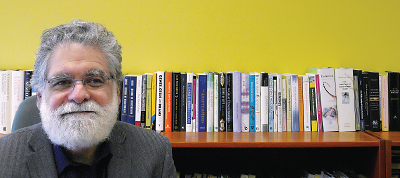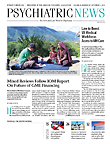“Culture” is much talked about as being an important factor to consider in medical care in general and psychiatric care in particular, but implementing a cultural consultation service is a complex affair, as Laurence Kirmayer, M.D., learned over the years.
Kirmayer is now a professor and director of the Division of Social and Transcultural Psychiatry in the Department of Psychiatry at McGill University and the co-editor of the book Cultural Consultation: Encountering the Other in Mental Health Care. He is part of a larger group of clinicians from Europe and North America who used the Outline for Cultural Formulation introduced in DSM-IV as a basis for applying a cultural approach in the clinic. That experience, in turn, led to development of the cultural formulation interview in DSM-5.
A Montreal native and McGill medical graduate, Kirmayer recently discussed in an interview in his office the work of the Cultural Consultation Service he established in 1999.
He initially drew on his experiences as a resident at the University of California, Davis, in the 1970s, where an experimental clinic looked at cultural issues by involving a healer or helper from the community as a consultant.
Back in Montreal, epidemiological research showed that Jewish General Hospital’s catchment area consisted of 65 percent immigrants from more than 50 countries. That eclectic population made use of general medical care at rates comparable to others in Montreal, but used mental health services far less frequently. This was not just a “healthy immigrant effect” but arose from the patients’ own interpretation of their problems or from decisions of primary care clinicians, he said. “So they were not getting care for even common mental health problems.”
Kirmayer and his colleagues then obtained a Health Canada government grant to study a culturally focused outpatient consultation model. In one way, it was already familiar to practitioners, who were accustomed to referring patients to a specialist for a diagnosis and treatment plan. The patient could then be sent back to the primary care physician for long-term follow-up or retained by the specialist if the case was severe enough.
In Montreal, the specialists were psychiatrists trained for cultural work who functioned as consultants to adult and child psychiatrists throughout Quebec province. The key was not only specialty knowledge but teamwork that included interpreters and “culture brokers.”
Language was the first hurdle.
“For most primary care doctors, if a patient had a bit of English or French, that usually sufficed, because it’s just too awkward or too expensive to work with an interpreter,” said Kirmayer. “It’s easy to say ‘OK, we’ll live with that.’ But when we bring in an interpreter, we often uncover huge amounts of information that was never collected, because the person didn’t feel free to talk about it or found it too difficult to talk about, or because the clinician didn’t have the time to draw it out.”
Culture brokers do a different kind of interpreting, he said.
They don’t merely translate words. They can explain to the clinician the meaning of the patient’s experiences, the nature of their context, their family factors, or the migration issues they might be experiencing.
These many layers of information were then discussed at multidisciplinary case conferences that included the chief of service, the culture broker, other clinicians and social scientists, and the referring physician or case manager, if available.
The work, however, is very labor- and time-intensive, he noted. Consultations take one to three hours and may include meetings with the patients, their families, interpreters, and others. After the first assessment, the consultant sends a short, one-page report with initial recommendations to the referring physician. The full consultation report is prepared after the case conference. Telephone follow-up and further consultations are available, if desired.
“The most dramatic outcome we found was that in roughly 50 percent of the cases, we changed the diagnosis because of earlier misinterpretation of symptoms or a lack of attention to context,” said Kirmayer.
The model has increased satisfaction among the referring clinicians, he said. “But because the program often has just a single contact with the patient, it is hard to show direct impacts on patients; the consultation is only one event in a long and often complicated trajectory.”
The cultural consultation service provides advantages to two other groups as well.
“The point of the consultation is not only to provide better care for the patient but also to use the consultation as an occasion to improve the skills of the referring clinician,” said Kirmayer. “A good consultation is not like pulling a rabbit out of a hat. It lays bare what information we collected and how we reached a certain conclusion, so that the referring clinicians can do some of the same things themselves the next time.
“This approach also provides a very interesting training setting for senior residents and trainees from family medicine and other disciplines. They can see in a powerful way the relevance of understanding culture as context—not as a label attached to people but as the social context that they’re living in and the values and perspectives that they hold—and understand very clearly how culture can have a profound effect on illness experience and recovery.” ■
More information on cultural considerations in psychiatric care can be found on APA’s website
here and in the video
here. APA made this information available as part of its Diversity Mental Health Month in July. The website for McGill University’s Division of Social and Transcultural Psychiatry can be accessed
here.

